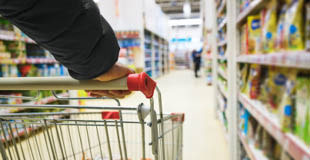Subsidiaries of Yum! Brands
- Kentucky Fried Chicken (KFC)
- Pizza Hut
- Taco Bell
Key Findings
- Yum! Brands, including subsidiaries Kentucky Fried Chicken (KFC), Pizza Hut, and Taco Bell, has adopted a beyond restricted substance list (BRSL) for consumer-facing food packaging sold at Taco Bell, with the goal of phasing out per- and polyfluoroalkyl substances (PFAS), bisphenol A (BPA), and phthalates by 2025. Yum! Brands will also phase out expanded polystyrene foam in food packaging by 2022.
- The company has not developed a BRSL for Pizza Hut or KFC or a comprehensive safer chemicals policy in general.
Recommendations for Yum! Brands
- Yum! Brands can make progress by developing a public written safer chemicals policy covering any toxic indirect food additives that may be in food contact materials, addressing at least bisphenols, per- and polyfluoroalkyl substances (PFAS), and phthalates for KFC and Pizza Hut, and addressing all bisphenols in food contact materials for Taco Bell. We also encourage the company to apply restrictions further up the supply chain to food processing equipment and all food contact materials in its supply chain.
- We urge the company to set public quantifiable goals with clear timelines to eliminate and safely replace plastics of environmental health concern (PEHCs), beyond polystyrene foam, from its packaging, and eliminate and safely replace any toxic indirect food additives that may be in food contact materials, beyond what Taco Bell has already pledged to eliminate. Yum! Brands should also publicly disclose the alternatives used to replace CHCs or PEHCs after eliminating them.
- The company should become a signatory to the Chemical Footprint Project and pilot it with key private label suppliers.
Grade History
How does Yum! Brands compare to its competitors?
Analysis of Yum! Brands
Oversight: Established management responsibilities and incentives
Disclosure: Requires suppliers to report use of chemicals in products to retailer
Action: Reduced or eliminated chemicals of high concern (CHCs) or plastics of environmental health concern (PEHCs) within the last three years
Safer Alternatives: Evaluates safer alternatives, avoids regrettable substitutes
Transparency: Demonstrates a commitment to transparency and public disclosure
Third-party Standards: Promotes credible third-party standards for safer products
Extra Credit:
Joint Announcement: Public commitment demonstrated through joint announcement
Continuous Improvement: Shows continuous improvement by steadily expanding safer chemicals policy
Collaboration: Actively participates in collaborative process to promote safer chemicals
Impact Investment: Investing financial resources into independent research into safer alternatives and/or green chemistry solutions




